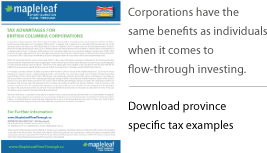Frequently Asked Questions about Tax Reporting
The following provides answers to general tax related questions our investors often have with respect to their investment in the Maple Leaf Short Duration Flow-Through Limited Partnerships.
When will my T5013 / RL-15 tax SLIP be mailed out?
In January and February of each year, Maple Leaf gathers from the resource companies in which it invests the tax information from their exploration and development activities. Once received, Maple Leaf compiles the tax information required to prepare per unit tax factors and posts these tax factors to
CDS Clearing and Depository Services Inc. The information is then collected from CDS by the back offices in order to prepare individual investor T5013 tax slips (or RL-15 tax slips for Quebec residents).
The regulatory deadline for T5013s to be mailed out is on or before March 31st of each tax reporting year.
-
If you have invested in a Maple Leaf Flow-Through prospectus offering your T5013 Tax Slips (or RL-15 Tax Slips for Quebec Residents) will be mailed to investors directly from their investment dealers back office. If you require a reprint of your Tax Slip, please contact your investment dealer's office and have them contact their back office for a reprint.
-
If you have invested in a Maple Leaf Flow-Through by way of
offering memorandum your T5013 Tax Slips (or RL-15 Tax Slips for Quebec Residents) will be mailed to investors from Maple Leaf's back office, IAS. If you require a reprint of your Tax Slip,
please contact Maple Leaf Funds directly.
What is my adjusted cost base (ACB) and how do I calculate it?
The adjusted cost base or “ACB” of a share is generally what you paid for it. However, as an offset to you realizing the significant tax deductions from investing in flow-through shares, you are deemed to have an ACB of nil, due to the receipt of the tax deductions equal to approximately 100% of the amount you invest. A nil adjusted cost base means that when you calculate your capital gains on the disposition of your mutual fund shares, you treat your adjusted cost base as zero. To calculate your adjusted cost base, please contact your investment advisor.
WHAT ARE CAPITAL GAINS AND HOW DO THEY APPLY TO MY FLOW-THROUGH INVESTMENT?
Capital gains occur when the original portfolio of flow-through shares purchased by the Partnership is sold. Typically, when a portfolio manager sells flow-through shares they do so with a view to reduce risk and or for reinvesting the cash into higher quality and lower risk investments. The capital gains are allocated to the limited partners on a proportionate basis. Based on the expected roll-over date of the Partnership and amount of capital gains incurred, Maple Leaf Flow-Through will consider a cash distribution to unit holders at the beginning of each year that material capital gains occur. This cash distribution is typically equal to 50% of estimated taxable gains, less any tax deductions provided to investors (at a rate of 45%) as reported on investors T5013 tax slips.
Are there any tax deductions (I.E. ISSUE COST DEDUCTIONS) to be claimed after A LIMITED PARTNERSHIP IS WOUND UP?
Initial offering expenses (Issue Costs) such as printing, Agents’ fees, legal, audit, traveling, distribution, courier, marketing and sales expenses and other regulatory and filing expenses are deductible over a five-year period beginning at the time such expenses are incurred for the purposes of the Income Tax Act, regardless of the fact that the Limited Partnership’s life is less than five years. Investors can expect to receive a T5013 for each year the Limited Partnership is active, including the tax year that it is wound up (the “Rollover”). For the remaining years following the Rollover (if any, up to 5 years) investors can refer to a ‘Schedule of Issue Cost Deductions for Future Years’ that will be posted on the Tax Reporting Information page of our website. This schedule will be posted on or before March 31st of the year following a Rollover.
The information on this page is not to be considered tax advice. Maple Leaf reminds you that each individual's tax and investment planning situation is unique and professional advice should always be received from a qualified tax and/or investment advisor. We strongly recommend that you consult with your tax advisor to determine the optimal use of these tax deductions as well as the impact to you, if any, with respect to either alternative minimum tax or cumulative net investment losses.
Tax Filing Guide, 2023
For Individual Investors
An investment in a Maple Leaf Short Duration Flow-Through Limited Partnership can provide up to a 100% tax deduction in the initial year of the investment. Individual investors may also realize tax deductions by utilizing the following tax planning options:
 Charitable Giving
Charitable Giving
 RSP Contributions
RSP Contributions
 Capital Loss Carry-Forwards
Capital Loss Carry-Forwards
 Reduce Tax Deductions
Reduce Tax Deductions
For Corporate Investors

 View Corporate Tax Planning Examples
View Corporate Tax Planning Examples